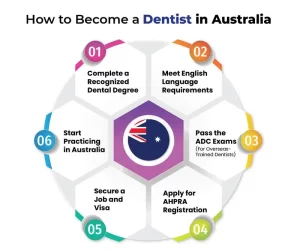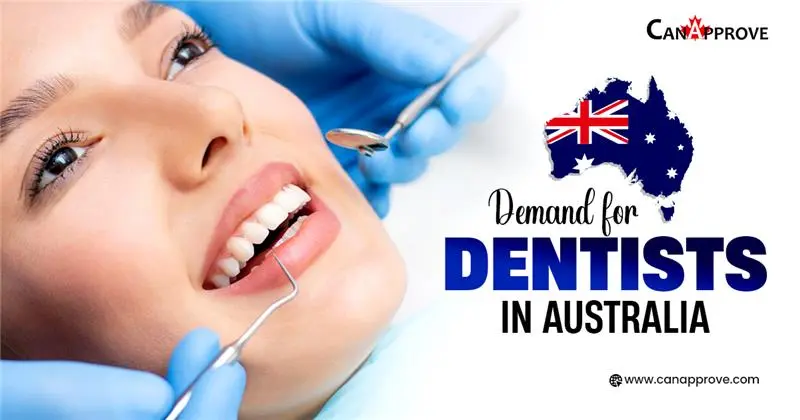Ever thought about how important a great smile is? Well, Australia sure has, because the demand for dentists is skyrocketing! From sparkling white smiles to critical oral health care, dentists are more essential than ever. But here’s the catch: some regions are facing a serious shortage of dental professionals.
So, what’s fueling this growing demand?
And if you’re thinking about a career in dentistry, is now the perfect time to dive in?
Let’s explore the trends, challenges, and opportunities shaping the future of dentists in Australia!
Table Of Content
1Are Dentists In Demand in Australia2Requirements to Work as a Dentist in Australia3Australian Dental Council Exam4How to Become a Dentist in Australia5Job Opportunities for Dentists in Australia6Dentist Salary in Australia7Frequently Asked Questions
Are Dentists In Demand in Australia
YES, dentists are in high demand in Australia, driven by factors such as population growth, increased awareness of oral health, and an aging population requiring more dental care.
While metropolitan areas have a steady supply of dentists, rural and regional communities often face significant shortages, creating strong job opportunities in those areas. Additionally, advancements in cosmetic dentistry and preventative care have increased patient visits, further boosting demand. Government initiatives, including skilled migration programs, also highlight the ongoing need for qualified dental professionals to meet the country’s healthcare needs.
Requirements to Work as a Dentist in Australia
Eligibility Criteria
To work as a dentist in Australia, you must meet the following requirements:
Recognized Qualification
- A Bachelor’s or Master’s degree in Dentistry from an accredited institution.
- If your degree is from Australia or New Zealand, you can directly apply for registration.
- If your degree is from another country, you must pass the Australian Dental Council (ADC) assessment.
Registration with the Dental Board of Australia (DBA)
- All dentists in Australia must be registered with the Australian Health Practitioner Regulation Agency (AHPRA).
- Overseas-qualified dentists must complete the ADC assessment process before applying for registration.
Pass the ADC Assessment (For Overseas Dentists)
- Initial Assessment – Submit documents for qualification verification.
- Written Examination – Test on theoretical dental knowledge.
- Practical Examination – Hands-on clinical skills assessment in Australia.
English Language Proficiency
IELTS or equivalent (OET, TOEFL, or PTE accepted).
Visa Requirements
A valid work visa.
Documents Required
Here are the key documents you’ll need
For ADC Assessment
- Certified copy of dental degree certificate
- Academic transcripts
- Evidence of clinical training hours
- Valid passport copy
- Curriculum Vitae (CV)
- Proof of English language proficiency (IELTS, OET, etc.)
- Registration certificate from your home country (if applicable)
- Good Standing Certificate from the dental board in your country
- Work experience documents (if applicable)
For AHPRA Registration
- ADC Exam completion certificate (if required)
- Professional Indemnity Insurance proof
- Identification documents (passport, birth certificate)
- National Police Clearance Certificate
For Visa Application
- Job offer letter (if applying for employer-sponsored visa)
- Skills assessment result (if applying for skilled migration)
- Health and character clearance (Medical Examination & Police Clearance)
Australian Dental Council Exam
ADC assessment includes two examinations after the initial assessment,
The Initial Assessment is the first step in the Australian Dental Council (ADC) process, determining your eligibility to proceed.
Eligibility: Minimum 4-year full-time degree/diploma with full and unrestricted registration.
Timeframe: Approximately 8 weeks
Cost: AUD 647 (application) | AUD 265 (renewal)
Validity: 7 years
Application: Open anytime
1. Written Examination
The ADC Written Examination is a two-day computer-based test that assesses the application of dental knowledge in clinical practice. It is the second stage of the Australian Dental Council (ADC) assessment process for internationally qualified dentists.
Eligibility
Must have completed the initial assessment by the ADC.
Exam Details
- Duration: 2 days
- Mode: Computer-based test (CBT)
- Cost: AUD 2,122
- Validity: 3 years
- Test Provider: Pearson VUE (conducted in test centers worldwide)
- Exam Schedule: Held twice a year, usually in March and September
- Results: Released approximately 5 months after the application period
Exam Focus
The written examination evaluates:
- Knowledge of dental science and clinical practice
- Clinical judgment and reasoning skills relevant to dentistry in Australia
Candidates should refer to the Written Examination Handbook for a detailed overview of the exam structure, format, and requirements.
2. Practical Examination
The ADC Practical Examination is a two-day simulation-based test that assesses the practical clinical skills of internationally qualified dentists. It is the final stage of the Australian Dental Council (ADC) assessment process before applying for the registration to become dentists in Australia.
Eligibility
- Must have successfully passed the ADC Written Examination.
- Must take the exam within three years of completing the written examination.
Exam Details
- Duration: 2 days
- Cost: AUD 4,775
- Validity: Does not expire
- Timeframe: Results released 4 to 7 months after the application period
Exam Structure
- Day 1: Technical skills assessment
- Day 2: Clinical skills assessment
- Covers the professional competencies of a newly qualified dentist to ensure candidates can practice safely in Australia
Exam Preparation
Refer to the Practical Examination Handbook and Practical Examination Information Package for a detailed overview.
Next Steps
After completing the ADC Practical Examination, candidates are eligible to apply for registration with the Dental Board of Australia.
For more information, visit the Australian Dental Council (ADC) website.
How to Become a Dentist in Australia
Australia has a strong demand for skilled dentists, offering excellent career opportunities, high salaries, and a clear pathway to permanent residency. Let’s check how you can become one;
 Step 1: Complete a Recognized Dental Degree
Step 1: Complete a Recognized Dental Degree
To qualify as a dentist in Australia, you must have A Bachelor of Dental Surgery (BDS) or Doctor of Dental Medicine (DMD) from a recognized institution.
- If you already have a foreign dental degree
- Degrees from the United Kingdom, Ireland, New Zealand, or Canada may be directly recognized.
- Degrees from other countries require passing the Australian Dental Council (ADC) assessment process (Step 3).
Step 2: Meet English Language Requirements
All dentists must prove their English proficiency through one of the following:
- IELTS – Minimum score of 7.0 in each band (If required, IELTS Academic)
- OET – Minimum grade of B in all sections.
- PTE Academic – Minimum score of 65 in each skill.
Step 3: Pass the ADC Exams (For Overseas-Trained Dentists)
If your degree is not from Australia or New Zealand, you must complete the Australian Dental Council (ADC) assessment, which has 3 steps
- ADC Initial Assessment
- ADC Written Exam
- ADC Practical Exam
Passing these exams is competitive, and preparatory courses can improve your chances to become dentists in Australia.
Step 4: Apply for AHPRA Registration
After passing the ADC exams, you must register with the Australian Health Practitioner Regulation Agency (AHPRA) to practice legally.
Types of Registration
- Provisional Registration: Required for dentists undergoing supervised practice (1-2 years).
- General Registration: Full license to practice independently in Australia.
Step 5: Secure a Job and Visa
Job Opportunities
- Private dental clinics – High demand, especially in rural areas.
- Public health sector – Government dental hospitals and community services.
- Academic and research roles – Universities and dental research institutions.
Visa Options
- Skilled Independent Visa (Subclass 189): No sponsorship is required.
- State-Sponsored Visa (Subclass 190/491): Faster pathway to permanent residency.
- Employer-Sponsored Visa (Subclass 482/186): For dentists hired by Australian clinics.
Step 6: Start Practicing in Australia
Once registered and employed, you can:
- Work full-time in high-paying roles with average salaries of $120,000+ per year.
- Specialize in fields such as orthodontics or pediatric dentistry for higher earnings.
- Apply for permanent residency (PR) after gaining experience in the industry.
Following these steps ensures a smooth transition into a successful dental career in Australia.
Job Opportunities for Dentists in Australia
Dentists in Australia have strong job prospects, with 21,200 employed professionals and an annual employment growth of 1,500. Opportunities exist in private clinics, public health services, and academic institutions. The median full-time weekly earnings for dentists are $3,877, and demand is particularly high in regional areas. To practice, registration with the Dental Board of Australia is required.
High Demand for Dentists
- Australia faces a shortage of dental professionals, especially in rural and regional areas, creating strong job opportunities.
- The Aged Care sector and public health programs (e.g., Child Dental Benefits Schedule) also need more dentists.
How to Find Jobs?
- Job Portals: Seek (seek.com.au), Indeed (au.indeed.com).
- Recruitment Agencies: (e.g., HCA Healthcare Recruitment, Dental Talent, Bupa Dental Careers).
- Networking: Join the Australian Dental Association (ADA) for job listings.
Dentist Salary in Australia
Dentists in Australia enjoy a stable and well-respected career with competitive earnings. The salary varies depending on whether they work as general dentists or specialists, with those in urban areas or private practice often earning more. Dentists in Australia also benefit from strong demand, particularly in regional and rural locations, where incentives may be offered to attract professionals. The profession provides flexibility with opportunities in public health, private clinics, or running independent practices. Overall, dentistry remains a lucrative and fulfilling career choice in Australia’s healthcare sector.
| State | Average Annual Salary |
|---|---|
| Western Australia | $215,000 to $235,000 |
| South Australia | $140,000 to $160,000 |
| Australian Capital Territory | $140,000 to $160,000 |
| New South Wales | $225,000 |
| Northern Territory | $190,000 |
| Victoria | $170,000 |
| Tasmania | $197,061 |
| Queensland | $160,000 |
Some cities provide high salaries for dentists in Australia; for example, the average annual salary for dentist jobs in Sydney ranges from $205,000 to $225,000, and in Perth ranges from $210,000 to $230,000.





